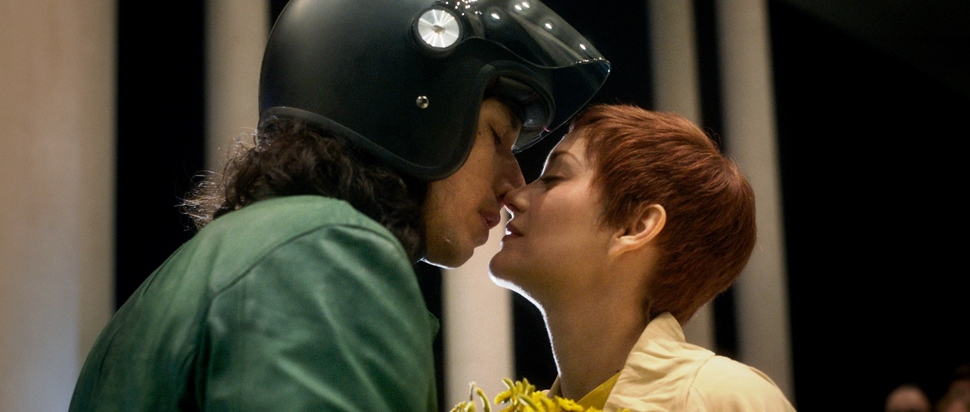EIFF 2021: Annette
Leos Carax's bizarre, bombastic rock opera musical Annette is a frustrating film but its chaotic playfulness is contagious
“So may we start?” asks the French director Leos Carax during Annette’s opening scene, set in a recording studio. Brothers Ron and Russell Mael of Sparks, who wrote this bizarre, bombastic rock opera musical, begin performing the opening song in front of their mics, but soon they, along with Carax and Annette’s stars, Adam Driver and Marion Cotillard, are marching down a street in LA, still singing and ready to begin. Driver and Cotillard are handed their costumes, transform into their characters and the narrative kicks in.
Annette centres on a celebrity couple: Henry (Driver), a hulking, chain-smoking comedian who bursts onto the stage like a boxer, ranting to his adoring audience; and Ann (Cotillard), a charismatic, glamourous opera singer, who spends most of her nights dying on stage. The performing pair are deeply in love – so they tell us through their repetitive ballad We Love Each Other So Much – and soon their daughter is born, the titular Annette, who is played by a marionette. Evoking shades of A Star is Born, Henry destroys his own career, his bitterness turning self-destructive, while Ann’s stardom only continues to rise. This love story soon becomes a tragedy.
One of the founders of cinéma du look, the ‘80s French filmmaking movement that favoured stylish spectacle, Carax relishes in artificiality. In Annette, he gleefully leans into the illusionary magic of classical cinema; during the film’s greatest set piece, the couple dance across a ship’s deck in front of a projected storm. And, of course, there’s Annette, a puppet: perhaps a statement on celebrity children, perhaps just another way to heighten the film’s artifice, perhaps Carax just didn’t want to work with a child actor.
Sparks’ songs are well matched to the literalness of Carax’s filmmaking, but their lyrics gesture to generic emotions and do little to convey the characters’ complexities beyond the obvious. Some songs simply become parodies of musical numbers. But vague signifying is a problem beyond Annette’s songs, particularly with Driver, who is left to act in a vacuum. Through onstage raving, the film presents Henry, the tormented monster, but it offers few insights into his tangled emotional motivations. Carax’s entire metafictional approach suggests Brechtian intentions and a condemnation of celebrity but it descends into a sprawling mess and remains flippantly vague.
Annette is a frustrating film and one that is in love with its own hollow posturing, but Carax’s chaotic playfulness is contagious and, despite its flaws, Annette casts a bewitching charm as a nihilistic fairy tale about the poison of fame.
Annette had its UK premiere on 21 Aug as part of Edinburgh International Film Festival; the film is released in UK cinemas on 3 Sep, and streaming from 26 Nov, via MUBI
